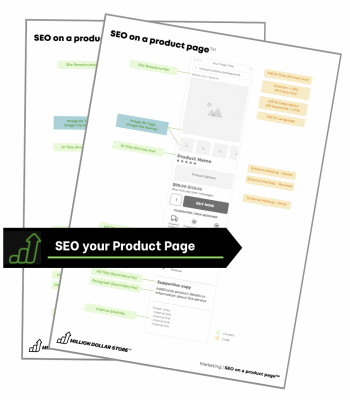Shopify SEO: How to Rank Your Store in Search Engines
Helps your set up your ecommerce store products so that you can rank in search engines
Are you struggling to drive traffic to your Shopify store? Are you looking to improve your search engine rankings? If the answer is yes, then you are not alone.
With so many online stores popping up every day, it can be challenging to stand out in a crowded marketplace.
However, by optimizing your website for search engines, you can increase your visibility and drive more traffic to your store. In this blog post, we will show you how to find the right keywords to target and where to include them on your website.
Keyword Research
The first step in optimizing your Shopify store for search engines is to conduct keyword research. Keyword research involves finding the right words and phrases that your customers are using to search for products or services like yours. By targeting these keywords, you can increase the visibility of your website in search engine results pages (SERPs) and drive more traffic to your store.
To conduct keyword research, you can use a variety of tools such as Google Keyword Planner, SEMrush, or Ahrefs. These tools can help you identify the most popular keywords in your industry and provide you with insights into how competitive those keywords are.
Once you have identified your target keywords, it’s time to start including them strategically on your website.
Including Keywords on Your Website
There are several areas on your website where you can include your target keywords to optimize your store for search engines. These areas include:
Title Tags: The title tag is the text that appears at the top of your browser window and is also displayed in search engine results. It’s important to include your target keywords in your title tag to let search engines know what your page is about. Make sure your title tags are unique and descriptive, and include your target keywords in a natural and compelling way.
Meta Descriptions
The meta description is a brief summary of your page’s content that appears in search engine results. It’s important to include your target keywords in your meta description to help search engines understand the content of your page. Make sure your meta descriptions are informative, engaging, and include your target keywords.
Product Descriptions
Product descriptions are an important part of your Shopify store. Make sure to include your target keywords in your product descriptions in a natural and compelling way. Avoid keyword stuffing, as this can hurt your search engine rankings.
Optimizing your Shopify store for search engines is an important part of driving traffic to your website. By conducting keyword research and including your target keywords strategically on your website, you can increase your visibility in search engine results pages and drive more traffic to your store. Remember to keep your content natural and compelling, and avoid keyword stuffing. With these simple steps, you can improve your search engine rankings and see real results in your traffic and sales.

The SEO Product Page Cheatsheet
helps you rank in search engines by;

Based off SEO’s best practices for ecommerce

So that search engines have the best chance of understanding your product

So that you can strategically include keywords where they are most needed





